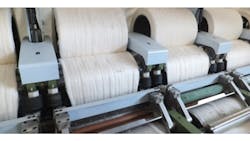Consumers to Manufacturers: Will Buy Only if 100% Authentic
Home goods and apparel manufacturers: Consumers are voicing their concerns. With a new president focused on protecting products born in the USA, consumers may be looking more closely at product origins, and could demand more transparency.
This sentiment is the result of a survey conducted by Harris Poll.
Thirty percent of Americans said that they would completely stop purchasing a brand if they made a false product claim about a bedding/clothing product being 100% organic, 100% Pima cotton, or other claim of this type, while roughly three in five Americans (61%) say if they found a brand made their bedding/clothing products from raw cotton that was picked by child laborers /forced laborers, they would no longer purchase the brand.
"This survey reaffirms what we have known all along," said Dr. James A. Hayward, CEO of Applied DNA Sciences, a provider of DNA-based supply chain, anti-counterfeiting and anti-theft technology, "Consumers want authentic products and want to trust in what they are buying. They have no interest in bringing a product into their home that has been born of any kind of forced labor.
Hayward explains that the methodology used by his firm, which is to “use the DNA that nature gave that commodity or to mark it with a manufactured DNA enables the cotton to be traced to where it was picked before it went into the ginning process that cleans away seed and other debris for packaging into bails to ship around the world for spinning, dyeing and to make into clothes."
Citing scientific proof of product claims as a key factor in consumer purchase decisions, the survey yielded telling insights involving product trust and how that trust influences the final decision to purchase or not:
- Over three quarters of Americans (76%) say when a product claim indicates cotton bedding/clothing is 100% organic, 100% Pima cotton, etc. they believe it is true.
- One quarter of Americans (25%) say if they discovered that a brand claimed a cotton bedding/clothing product was 100% organic, 100% Pima cotton, or other claim of this type, and it turned out not to be true, it would have a lot of negative impact on their likelihood to purchase that brand and 3 in 10 (30%) say it would completely stop them from purchasing that brand.
- 78% of Americans say if a cotton bedding/clothing product claimed to be 100% organic, 100% Pima cotton, or other claims of that type, and all else was equal, they would be likely to buy a brand that showed scientific proof of its claim over one that did not.
- Nearly one third of Americans (32%) say if they found out a brand that claimed to make their bedding/clothing products from cotton grown in the U.S. but actually used a blend of cotton grown in the U.S. and China, they would purchase less frequently from that brand.
- Roughly three in five Americans (61%) say if they found out a brand made their bedding/clothing products from raw cotton that was picked by child laborers/forced laborers, they would no longer purchase from that brand.
